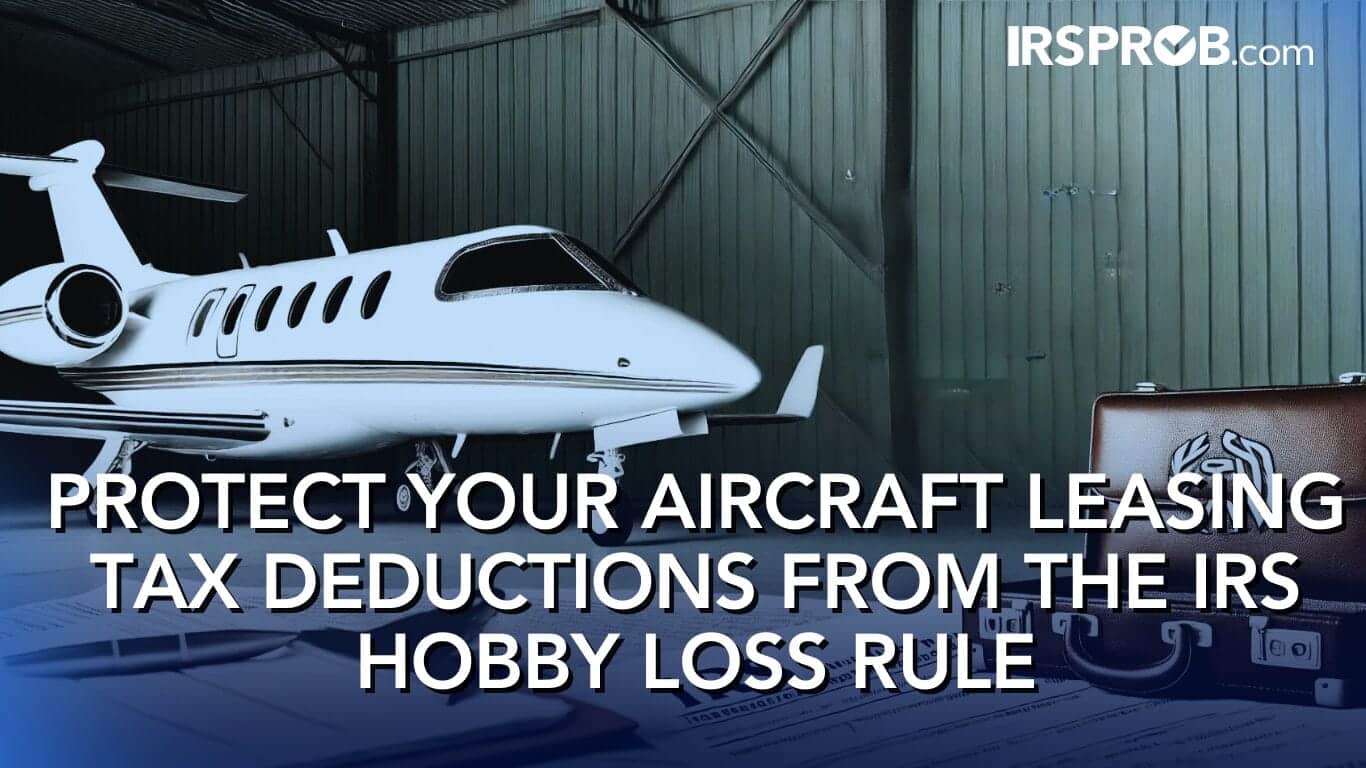
Owning and leasing an aircraft can be an effective way to offset the high costs of ownership. However, as beneficial as this strategy might seem, it’s not without its challenges—particularly from the IRS. The IRS has been increasingly scrutinizing aircraft leasing arrangements, and the Hobby Loss Rule is one of the primary tools they use to disallow deductions related to these activities. If you’re a business owner who leases aircraft, it’s crucial to understand how to protect your tax deductions from being classified as hobby losses.
What is the IRS Hobby Loss Rule?
The IRS Hobby Loss Rule, governed by IRC Section 183, is designed to prevent taxpayers from deducting expenses related to activities that are not primarily profit-driven. If the IRS determines that your aircraft leasing activity is a hobby rather than a business, you could be taxed on all income from the activity while being disallowed from claiming related deductions, such as depreciation and operating expenses.
For example, if your aircraft leasing LLC reports $100,000 in income but incurs $300,000 in depreciation and $50,000 in operating expenses, under the Hobby Loss Rule, you would still report $100,000 in taxable income but would not be allowed to claim any of the $350,000 in expenses as deductions.
Why Aircraft Leasing is Under IRS Scrutiny
Recently, the IRS has targeted private jet usage as part of a broader effort to ensure high-income taxpayers are meeting their tax obligations. Although this announcement specifically mentioned personal use of corporate jets, it’s likely that all aircraft leasing arrangements will come under increased scrutiny, with IRS examiners using the Hobby Loss Rule as a means to challenge the deductibility of these activities.
Nine Factors the IRS Considers
The IRS uses nine factors to determine whether an activity is engaged in for profit or is merely a hobby:
- Manner of Activity: Conducting the activity in a businesslike manner, maintaining accurate books and records, and using up-to-date lease agreements.
- Expertise: Engaging professionals knowledgeable in aircraft leasing.
- Time and Effort: The time devoted to the activity and the use of competent staff to manage it.
- Appreciation of Assets: Expectation that assets used in the activity will appreciate.
- Success in Similar Activities: Success in similar or related business activities.
- History of Income or Losses: A history of income or losses with respect to the activity.
- Occasional Profits: The occasional profits earned from the activity.
- Financial Status: The financial status of the taxpayer and whether they are dependent on income from the activity.
- Personal Pleasure: The element of personal pleasure or recreation involved in the activity.
No single factor is decisive, but activities that operate at a loss, involve depreciating assets, or are used extensively for personal purposes are particularly vulnerable to being classified as hobbies.
How to Protect Your Aircraft Leasing Deductions
To safeguard your tax deductions, consider the following strategies:
- tructure Your Activity Properly: If owning the aircraft in a separate legal entity is necessary, work with qualified tax and legal professionals to ensure your leasing activity satisfies several of the IRS’s nine factors, particularly those related to businesslike conduct, expertise, and the time and effort devoted to the activity.
- Use a Single-Member LLC within Your Business: Another effective strategy is to have your aircraft owned by a single-member LLC that is wholly owned by your existing business, such as an S corporation. This structure can provide liability protection while also making the aircraft part of a profitable business operation, thereby shielding it from the Hobby Loss Rule.
- Document Everything: Keep meticulous records of your aircraft leasing activities. Ensure that lease agreements, financial records, and operational documents are up-to-date and consistent with industry standards.
- Avoid Extensive Personal Use: Limit personal use of the aircraft to avoid giving the IRS reason to classify the activity as a hobby.
Conclusion
Leasing an aircraft can be a financially savvy move, but the IRS’s increasing scrutiny means that business owners need to be diligent in how they structure and document their leasing activities. By understanding the Hobby Loss Rule and taking steps to protect your deductions, you can continue to enjoy the benefits of aircraft ownership without the risk of unfavorable tax consequences.
For more information or assistance with protecting your tax deductions, contact us at IRSProb.com.







